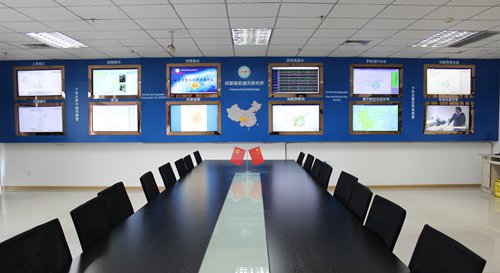China’s earthquake early warning system effective, saves lives: developer

The earthquake early warning center at the Sichuan-based Institute of Care-life (ICL) Photo: Courtesy of ICL
China's earthquake early warning system developer rebutted criticisms from expert of media hype, saying the system has been proved to be able to help people escape from danger when facing high-magnitude earthquake and reassure the public during low-magnitude earthquake.
"You can understand the necessity of having such a pre-warning system just by seeing how Chengdu residents reacted to the early warning on social media," Wang Tun, head of Sichuan-based Institute of Care-life, told the Global Times. "The system has two functions: helping people escape from danger and reassuring the public."
Wang's early warning system provided residents in Southwest China's Sichuan Province life-saving seconds to escape from a 6.0-magnitude earthquake on Monday.
Even though Chinese media have spoken highly of the pre-warning system and its pioneering technology, some experts have expressed doubt over the media coverage and commercial interests of the system.
On Tuesday, Sun Shihong, a researcher at the China Earthquake Networks Center, told The Beijing News that exaggerating the effectiveness of Wang's earthquake early warning (EEW) system may mislead the public. "The original intention of the earthquake early warning system is to reduce the impact of disaster. There was a 60-second early warning for Chengdu, and the speed of the seismic wave is six miles per second. As a result, the destructive effect of the 6-magnitude earthquake was not serious for Chengdu, which is 360 miles away from the earthquake's epicentre, so you can't say the system reduced the impact of the disaster," Sun told Beijing News.
Regarding comments that local people were ignorant of the system, Wang said at least the EEW system had not created fear and panic.
"People who were aware of the system knew how to escape from danger; for those who were not aware of the system, they did not take any dangerous actions. That is why we set the alarm as a countdown instead of warning of an earthquake," Wang explained.
Sun also noted that academia had not reached any final conclusion about the EEW system, and some parts of the EEW system had not been scientifically verified. "The promotion of the system might be due to commercial interests," Sun told Beijing News.
In reply, Wang told the Global Times that the system is for the public good and free for local residents. He said Mexico and Japan have both run the system with good results in their countries, so it doesn't make sense to say the EEW system lacks scientific verification.
But "being commercial is also naturally a part of it," he said, pointing out that if factories, communities and companies want to shut down their automatic systems, they need to buy the system's hardware facilities.